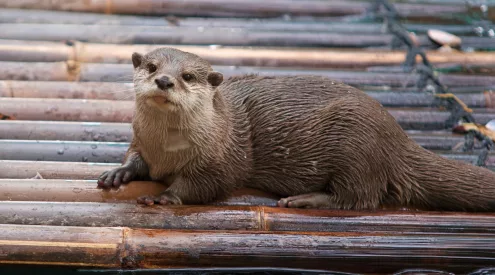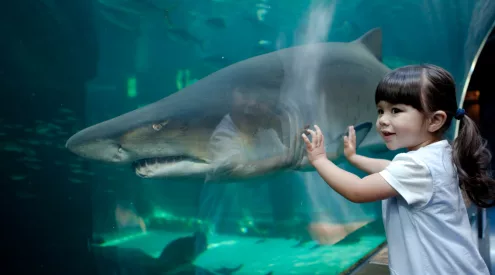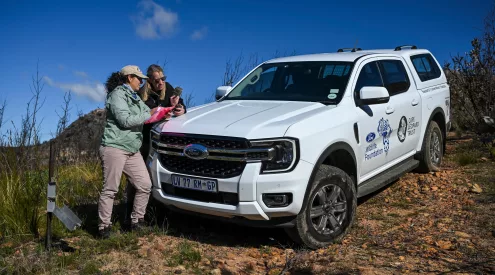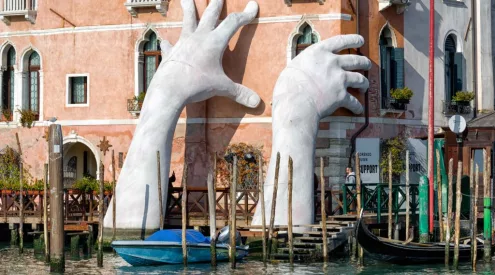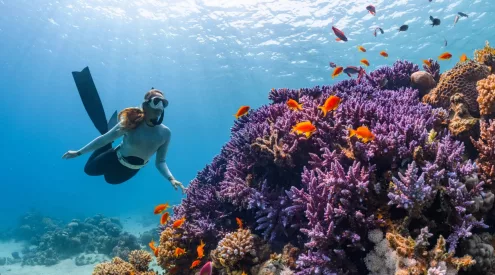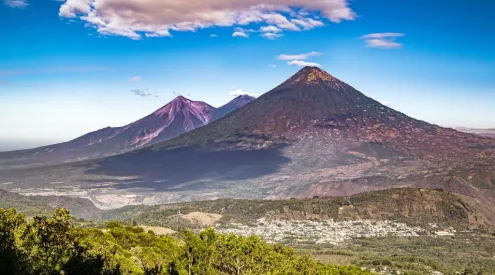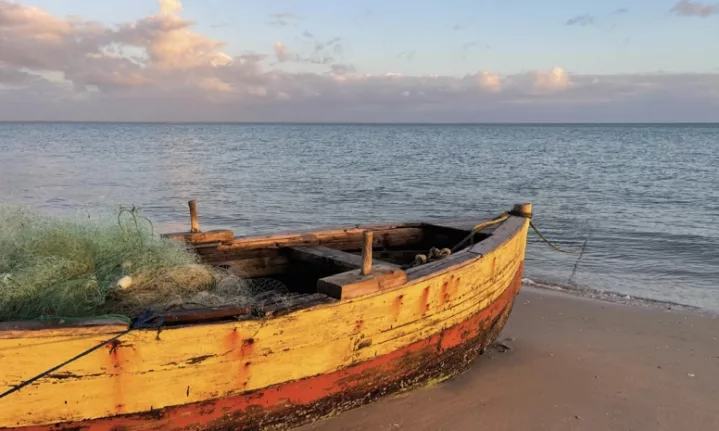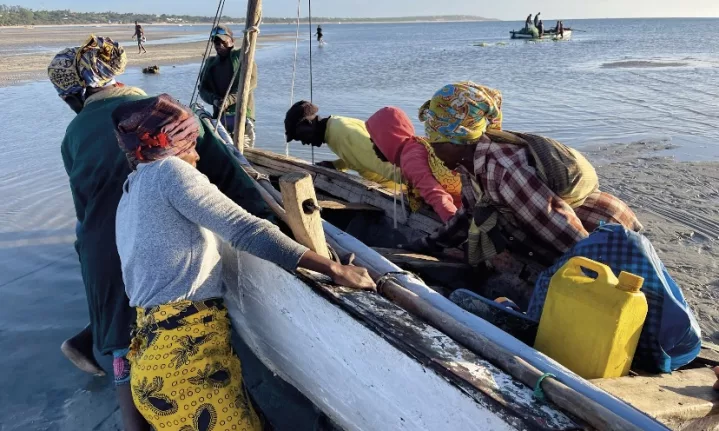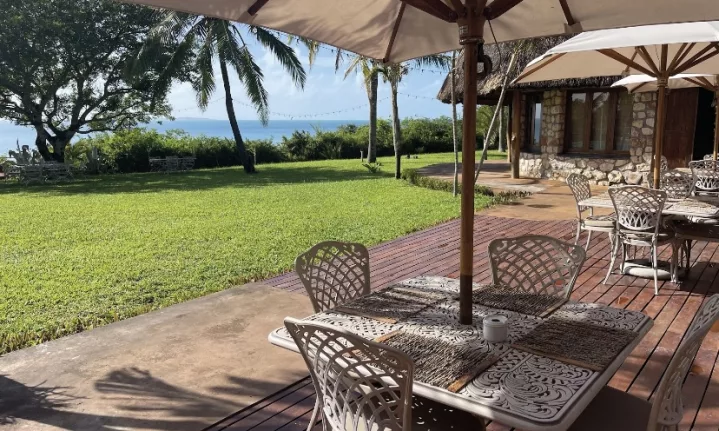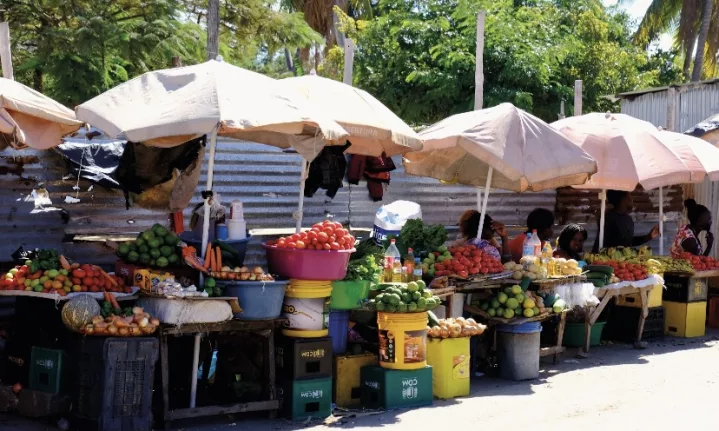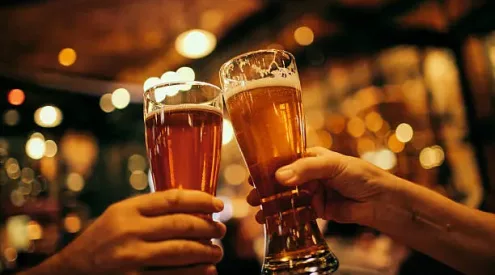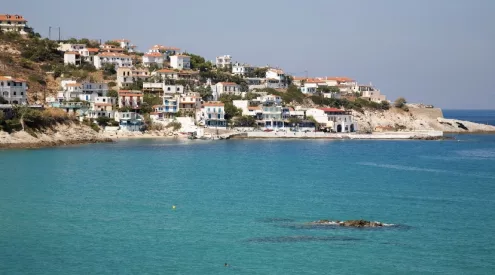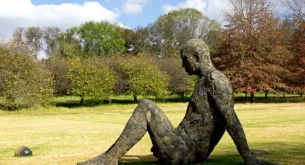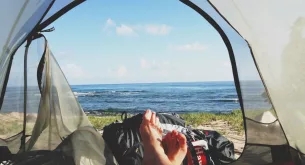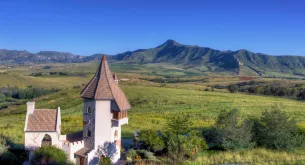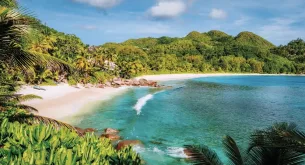Mozambique has always been popular with South African travellers, rivalling other international destinations for its remote beaches, its ocean’s awe-inspiring colours, abundant water activities, traditional culture and cuisine, and reasonably priced accommodations.
Vilankulo, in the Inhambane Province (the south-eastern region of Mozambique), is a small coastal town named after Gamela Vilankulo Mukoke, a local tribal chief. Known as the gateway to the Bazaruto Archipelago – with six islands in a Marine National Park – Vilankulo is a destination in its own right.
After an easy 90-minute flight from Johannesburg, I stroll in bright sunshine from the Embraer E-Jet to Vilankulo Airport’s terminal building. Through customs in a few minutes, a driver welcomes me from Bahia Mar Boutique Hotel, where I will be based to explore the area. As the airport is 2 km from downtown Vilankulo, we are soon driving through the town’s 5km built-up strip, then northward to hills glistening with palm trees, overlooking the bay and beaches.
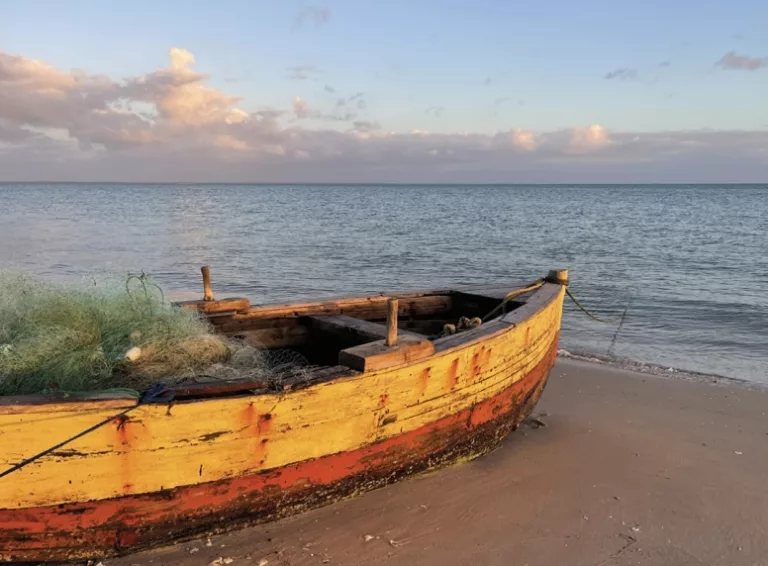
Resting and Musing
My compact room at Bahia Mar Boutique Hotel has white walls, an open-plan bathroom with a shower, a separate toilet and ample shelving. The housekeeper has folded blue towels into an ocean-themed shape of rolling waves on my king-size bed. Hibiscus flowers adorn the twin basins. My private porch’s table, chairs and umbrella-shaded loungers offer an ideal clifftop position for holiday reading. Gazing at the dazzling view of sunlight on the bay’s calm waters, I breathe in the privilege of stillness, settle into the change of pace and savour the moment. The serenity is revitalising and feels deliciously indulgent.
A Kaleidoscope of Blues and Dhow Cruises
The ocean views on the Vilankulo coastline are the kind where ‘on a clear day you can see forever’ towards a chain of islands of the Bazaruto Archipelago. With the ebb and flow of the tides, the colours in this Marine National Park in the Indian Ocean constantly shift, with shades of blue like a window to the ocean floor’s topography and depth. Today, the deepest water is cerulean, the most shallow depths are azure, the horizon has stripes of Tiffany Blue and the exposed sandbars are chalk-white. I’m in blue-hued bliss. The dhows’(traditional, locally made wooden sailing boats) sails add subtle touches of ivory and light biscuit, which reminds me of butterflies with closed but fluttering wings.
During my cruise on one such dhow, I am surprised by the quietness, with only the sound of waves lapping gently against the rough-hewn hull. Spotting a pod of Spinner dolphins, schooling fish and a turtle, the guide uses the sails to chart our course when the wind is high and a pole when the breeze dies down. From the deck, I can watch the sands shift on the red dunes that span the coastline while sipping a gin and tonic – the quintessential tipple during an African sunset – and watching the fast-fading light, lambent on the waves. Molten vermillion, or tangerine, gives way to a moonlit sea.
ALSO READ: Discovering Sierra Leone: A captivating gem
Beach Walks and Nature Nirvana
With the first glimpse of the sun’s rays reflected in the sea in the morning, I am up, into my swimming costume and wrapped in a Mozambican capulana (a type of sarong) to walk down wooden stairs to the beach below the Bahia Mar. Local men from Vilankulo and nearby villages are striding out to their fishing dhows, chatting and helping each other cast out, while the women wait on the beach to help haul in the catches of the night or push beached boats into the water.
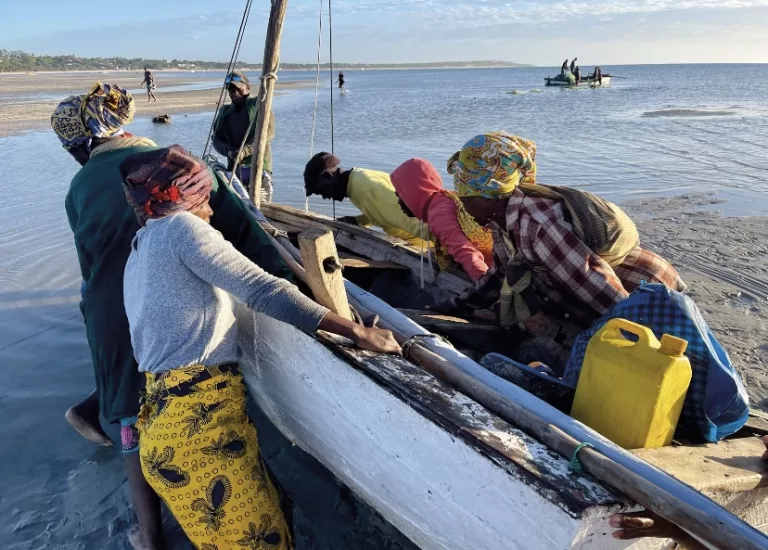
The waves swirl about my feet, flickering with a soft radiance and offering shells and shards of mother-of-pearl. After a night of foraging, a ghost crab scuttles sideways back to his burrow, next to which he has neatly piled a mound of sand to impress the ladies with his organisational and design skills. Molluscs slither along the low tideline, searching for filamentous algae to eat; a little egret takes off from the water’s edge, revealing his yellow Jimmy Choos, while white-breasted cormorants stand on driftwood displaying their wings like men with bulging biceps at a bar counter. The water is warm, so I swim out to sea.
Peri-peri Prawns and Portuguese Pastries
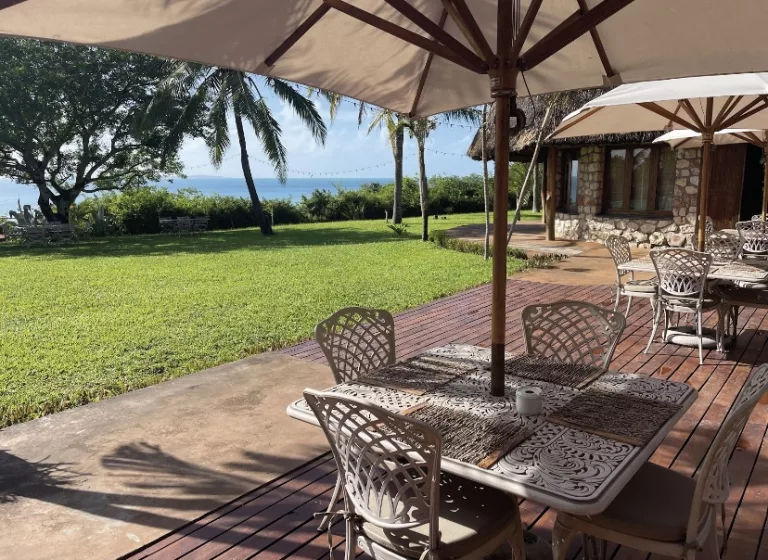
After my beach venture, I enjoy a Hatha yoga class at the Bahia Mar Club, then a relaxed breakfast. My table is on a wooden deck overlooking indigenous vegetation, down past the beach to the ocean beyond that is turquoise and aquamarine today. A pair of scarlet-chested sunbirds flit in the canopy above me. I can hear tropical boubous duetting with their distinctive loud calls, but I can’t spot them in the bushes.
A nutritionist plans meals for those who wish to lose weight or detox during their retreat at Bahia Mar Club. The hotel caters for vegan and other dietary requirements. The breakfast menu includes chia pudding or oats soaked in coconut milk and cinnamon. Falling in neither of these groups, I choose a vegetarian eggs Benedict with spinach on the chef’s rye bread, as tempted as I am to try the fresh greens and salmon with cream cheese. I’m more than happy with my choice, and to my delight, the full breakfast buffet offers freshly baked cakes, muffins and perfect Portuguese rolls. The pastéis da nata – a legacy from the Portuguese culture of the colonialist era – is a treat. The restaurant welcomes day visitors to linger and savour the tranquil atmosphere.
Not to be missed while in Vilankulo is tucking into a pile of prawns, shrimps, or a crayfish grilled in peri-peri sauce or butter. Wash that down with a renowned Dois M (2M) beer. Hotels and restaurants support local fishermen who bring their catches of the day for inspection. During my stay, I benefit from their bounty, relishing each seafood meal and trying line fish, calamari, squid and crab, and matapa (seafood stew) with staple food, xima (like South African mieliepap), cassava or rice.
Exercise and Excursions
Day visitors and resident guests can venture into the Bahia Mar Spa for a relaxing or stimulating massage with aromatherapy unguents. Fitness instructors and personal trainers supervise holistic workouts for individuals and groups in the gym. A separate section offers aerobics, Aero-step, anti-gravitational training classes and several types of yoga practice. I train daily in an infinity pool long enough to do laps.
Scuba diving and snorkelling in the Marine National Park herald a rich diversity of tropical fish: manta rays and whale sharks from October to April; migrating humpback whales between July and December, plus five species of turtle nesting between November and March. My memorable sightings at Two Mile Reef include a crocodile fish, nudibranchs on exquisite hard and soft corals, pipefish and a honeycomb moray eel. On the speedboat back to Vilankulo, we stop to observe spinner dolphins. The white of a sandbar contrasts with pink-tinged, foraging flamingos as we search, sadly in vain, for the endangered rare cetacean, the dugong, that feeds on seagrass but that the local fishermen inform us they have not spotted today.
A scenic flight with Wildlife Helicopters over the ocean in the Bazaruto Archipelago is an awe-inspiring treat, affording me a fabulous view of a bobbing green turtle and humpbacked dolphins and a bird’s-eye view of the archipelago.
During a day trip to Magaruque Island for a picnic, we stroll on Pansy Island, strewn with Pansy Shells, also known as Sand Dollars. As tempted as I am to take one home as a trophy, I know better.
Chatting and Shopping
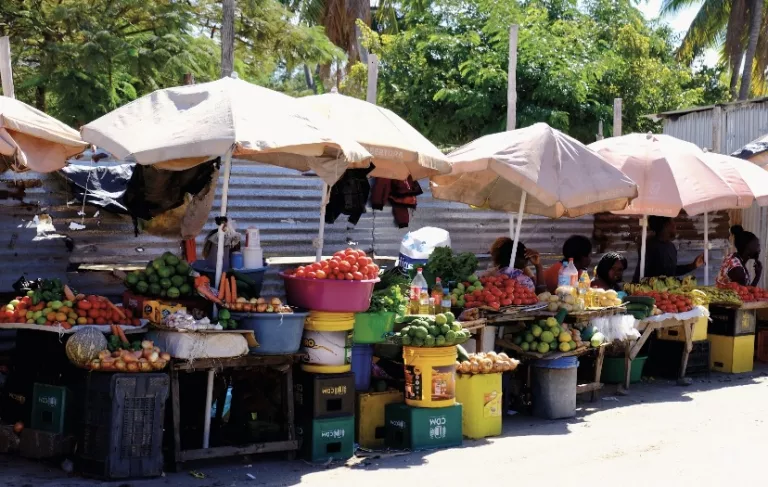
We drive through the town to see the homes, small stalls next to the roads and locals strolling in the streets towards the Vilankulo Mercado. This market is vibrant with an energising bustle. It’s a great spot to meet Mozambicans as they haggle for dried or fresh fish, fruit and vegetables. Although geared for residents to buy household items, I find shops that stock capulanas in rich Mozambican colours and designs, arts and crafts like woven baskets, plus other items that may appeal to tourists. After a chat and a few laughs, most locals are relaxed when I ask to photograph them. Others demand money and are dismissive towards me, which I interpret as perhaps tourist fatigue or resentment that they are not getting the money tourism promised. One sweet young woman tells me shyly that she doesn’t want her photograph taken as she doesn’t feel smartly dressed – her humility, beauty and charm perfectly sum up my experience of Vilankulo’s people.
With mesmerising views of the sea and sky’s changing blues, exceptionally rewarding diving, snorkelling and deep sea fishing, delectable seafood and the hotel staff’s genuine kindness, Vilankulo makes for a memorable holiday.
Trip Planner
As Mozambique is a malaria area, pack cotton or linen clothes, including long-sleeved shirts and trousers, to cover up in the evenings and early mornings. Bring a reliable anti-mosquito cream. Hotels usually have mosquito nets in the bedrooms. Your doctor or a travel clinic can advise you whether to take malarial prophylactics – but remember not to take Lariam (Mefloquine) if you plan to dive.
If driving, choose a 4×4 vehicle. Seek local advice on road conditions before travelling. Avoid giving sweets to local children. Instead, take a few soccer balls to kick around with the villagers and offer as gifts.
All visitors to Mozambique must possess a passport valid for at least six months after they depart from the country. Everyone except South African, Zambian, Botswanan and Swaziland citizens needs a visa.
Invest in a power plug travel adapter for socket types C, F and M.
The official currency is the Mozambican metical (MZN). To exchange cash, use South African rands or US dollars. Hotels accept credit cards.
This article first appeared in Getaway’s December 2024 print edition. Find us on shelves for more!
Follow us on social media for more travel news, inspiration, and guides. You can also tag us to be featured.
TikTok | Instagram | Facebook | Twitter
ALSO READ: Why Ibiza should be on your bucket list


